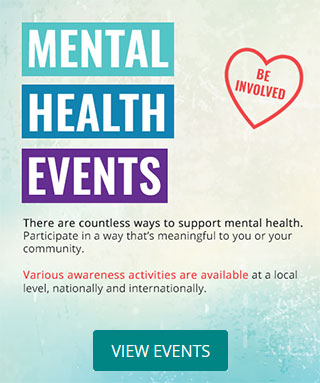PHYSICAL HEALTH
Dental care

In this section we address reports that the oral health of people affected by mental illness is worse than the general population. This can be attributed to medications as we note below.
Oral health & medication
The literature reports that the oral health of people affected by mental illness is worse than the general population. This can be attributed to medications causing dry mouth (Xerostomia), but also compounded by other factors such as lack of education or access to appropriate health care.
Oral hygiene
The Australian Dental Association (ADA) have created a series of educational videos to assist all Australians with maintaining their oral health, including instructional videos.
Dental care
Frequently asked questions (FAQs)
What is dry mouth (Xerostomia)?
The literature reports that the oral health of people affected by mental illness is worse than the general population. This can be attributed to medications causing xerostomia, but also compounded by other factors such as lack of education or access to appropriate health care.
Xerostomia is a condition commonly known as dry mouth. While there are several causes, it is known that many medications can cause dry mouth. It is often left undiagnosed and untreated, and ultimately can have a negative impact on one’s quality of life.
Saliva plays an important protective and functional role in the oral cavity. It contains lubricants, digestive enzymes, immune mediators and water. A lack of saliva can therefore:
- affect one’s ability to chew
- alter taste perception
- cause cracked lips
- impair denture retention
- increase risk of dental caries (decay)
- increase risk of periodontal disease
- impair the immune response
- impair digestion of food
In mental health, prescribed medications such as anti-depressants, anti-psychotics, anti-convulsants, anxiolytics, anti-cholinergics and alpha agonists can cause dry mouth (xerostomia). Patients who are prescribed more than one of these medications has a significantly higher risk of salivary hypofunction and therefore dry mouth.
Patients who have dry mouth (xerostomia) are automatically considered high caries risk, given their teeth are lacking the protective saliva barrier. Therefore, patients need to be diligent with regard to oral hygiene practices. This means:
- brushing twice a day with fluoridated toothpaste
- flossing
- consulting a dental professional at least once a year for a check-up
There are several ways to alleviate symptoms of dry mouth (xerostomia) which include:
- maintaining hydration with 2-3L of fluid per day – saliva reflects one’s level of hydration
- chewing sugar-free gum
- apply topical saliva substitutes and lubricants
In order to minimise the risk of dental caries, the following lifestyle choices are encouraged:
- minimise snacking, and have regular meals
- reduce sugar and acidic food and drink intake
- avoid smoking, alcohol and caffeine intake
- increase teeth exposure to calcium containing products such as cheese and milk
- topical application of remineralising agents in gum or mousse form – see your dentist
Patients who are on psychotropic medications can be affected by varying levels of drymouth (xerostomia). Saliva dysfunction may be secondary to deficiencies in quantity and/or quality. In order to determine whether there is a problem, saliva function tests are available, and patients are encouraged to see a dental professional.
If dry mouth (xerostomia) is diagnosed, it can be managed effectively by a dental professional or referral to an oral medicine specialist.
Are there any medication safety issues and conflicts?
It is common to be prescribed analgesics for pain such as paracetamol, non-steroidal anti-inflammatories (NSAIDs) and opioids. People who suffer from depression are often on anti-depressants such as selective serotonin receptor inhibitors (SSRI). SSRIs can interact with opioid analgesics such as tramadol which can lead to a complication known as serotonin syndrome. This is particularly important for patients who may be sensitive to codeine containing medication and tramadol is selected as an alternative.
Local anaesthetic drugs are used on a daily basis in dental practice. Local anaesthetics often contain adrenaline which aid in a more effective and longer lasting anaesthesia. While adrenaline is a hormone produced by the body, adrenaline containing anaesthetics should be avoided in patients who are on monoamine oxidase inhibitors (MAOs), a particular class of antidepressant.
Clozapine is an atypical anti-psychotic medication used to treat schizophrenia. It can cause a potentially life-threatening condition known as agranulocytosis, which is an acute severe leukopenia. The body’s ability to fight infection becomes compromised which can lead to infection affecting any organ. It can however be asymptomatic until it is too late. This emphasises the importance of good oral hygiene to minimise the risk of an oral source of infection.
Anticonvulsant medications such as sodium valproate and lamotrigine can be used to treat bipolar disorder. A well-documented side effect of anticonvulsant medications is gingival hypertrophy. This is the enlargement of the gingival tissues which can accumulate more plaque, and therefore cause pain and bleeding. Although the condition is linked with the class of drug, it has a higher incidence in people who have pre-existing poor oral hygiene. Therefore, the first line management is oral hygiene measures and professional cleaning and debridement. If this is unsuccessful, substituting for another mood stabilising medication may be required.
Given patients with mental health conditions are known to have a higher incidence of dental problems, they are encouraged to visit the dentist annually. An understanding of one’s medications, as well as disclosing a full medical history to the dentist can avoid potential adverse outcomes.
What is gum disease?
Resources
Oral hygienne resources
With special thanks to
Many people have contributed to the development of this project through research, focus groups, advice, information and ideas. We would like to acknowledge and thank all who have contributed and supported us in our endeavor. They are:
Dr Tiffany Van Dental Surgeon
Rowena Tran Dental student
Newsletters
Stay in the loop with our monthly newsletters!
If you are having thoughts of suicide, or severe self-harm please follow your crisis plan. If you do not have a crisis plan please call your treating clinician, therapist, general practitioner, one of the numbers listed below or go to the Emergency Department of the nearest hospital. In a life-threatening emergency ring 000.
Phone numbers and other supports that can be contacted in a crisis:
Life Line: 13 11 14 | www.lifeline.org.au
Sane Helpline: 1800 187 263 | www.sane.org






 The 2014 Act came into effect in July 2014. It introduced new principles to support people experiencing mental illness to make and participate in treatment decision (shared decision making) and to have their views and preferences considered and respected.
The 2014 Act came into effect in July 2014. It introduced new principles to support people experiencing mental illness to make and participate in treatment decision (shared decision making) and to have their views and preferences considered and respected.
